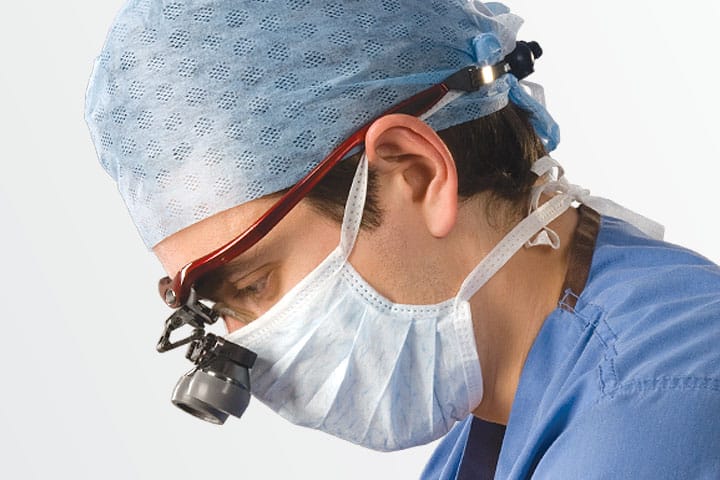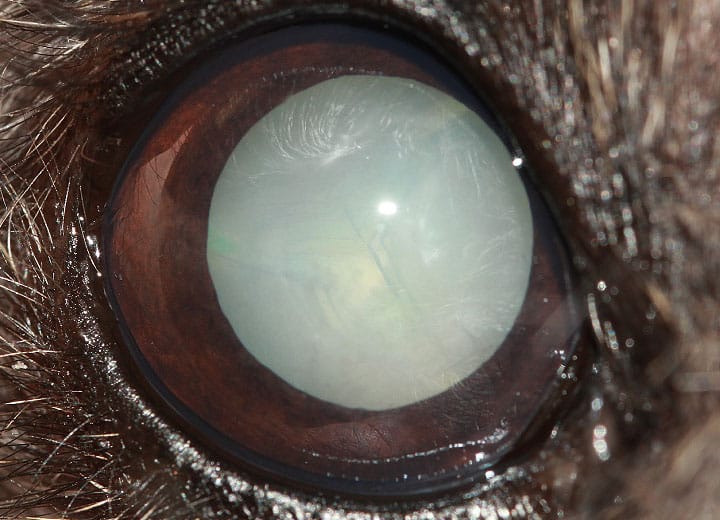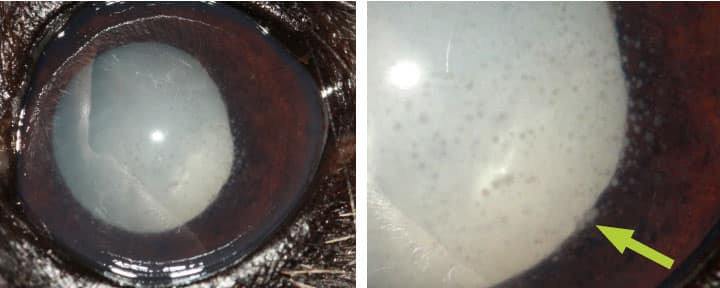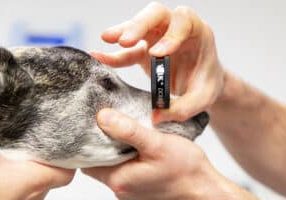
In a retrospective study of 200 dogs with diabetes mellitus, half had developed cataracts by the 170th day post-diagnosis and 75% and 80% by 370 days and 470 days respectively.
Diabetic cataracts develop in dogs due to an increase in the amount of glucose reaching the lens. Once the usual pathway for glucose metabolism is saturated, glucose is shunted towards an alternative pathway which results in the accumulation of sorbitol, a sugar that does not readily diffuse across the lens capsule. Water is then drawn into the lens by osmosis, leading to disruption of the lens fibres and cataract.

Diabetic cataracts develop rapidly and blind the patient, having an impact on quality of life. Cataract surgery is both expensive and involves a significant time commitment from the client, so it is important to discuss cataracts when diabetes is first diagnosed. Diabetic cataracts also have some particular features which mean they should be addressed more urgently than other types of cataracts.
Lens Capsule Rupture
The mechanism by which diabetic cataracts form, with water drawn into the lens by osmosis, results in swelling of the lens. This can be dramatic – a normal canine lens measures around 7mm from the anterior to posterior lens capsule, but lenses affected by diabetic cataracts can reach as much as 10mm. This swelling results in a risk of lens capsule rupture, releasing lens proteins into the eye, resulting in ‘phacoclastic’ uveitis. This inflammation can be catastrophic for the eye if not treated as an emergency. Because of the risk of lens capsule rupture, diabetic cataracts are therefore treated urgently – we operate on most of our diabetic patients within two weeks of them presenting with mature cataracts, provided they are well enough.
Lens-Induced Uveitis
Even without lens capsule rupture, proteins leak from cataractous lenses, resulting in a degree of inflammation in the eye (‘phacolytic uveitis’). Diabetic cataracts tend to result in more inflammation and so starting a topical non-steroidal anti-inflammatory drop (e.g., Acular) when diabetic cataracts are diagnosed is advised.

Keratoconjunctivitis Sicca (KCS)
Schirmer tear test readings have been reported to be significantly lower in diabetic dogs with cataracts, compared to dogs without cataracts. Reduced corneal sensitivity, which has been demonstrated in diabetic human patients, is one possible reason for this. Prompt diagnosis and management of KCS will help to reduce the risk of corneal complications such as ulceration, but also pigment and vascularisation, which can make surgery challenging.
Diabetic Control
It is ideal for a diabetic patient to be well-controlled before general anaesthesia and surgery. However, some diabetic patients are challenging to stabilise and if we try and wait for perfect diabetic control, we risk complications for the eyes. As a general rule, we like to see that the patient’s weight is stable, that polydipsia/polyuria has reduced, and that there is no recent history (in the last month) of ketoacidosis or of pancreatitis.
Diabetic Cataracts
Key Messages
- Discuss cataracts with clients soon after diagnosis of diabetes, so that they are prepared and can also plan for the cost of managing the diabetes and potential cataract surgery
- Examine the eyes each time you see the patient, so cataracts are spotted as they are forming, rather than when the dog is blind
- Start a topical NSAID when cataracts are noted
- Monitor Schirmer tear test readings in diabetic patients – there is an increased risk of developing keratoconjunctivitis sicca
- Refer early – don’t wait for perfect diabetic control
Case Advice or Arranging a Referral
If you are a veterinary professional and would like to discuss a case with one of our team, or require pre-referral advice about a patient, please call 01883 741449. Alternatively, to refer a case, please use the online referral form
About The Discipline
Ophthalmology

Need case advice or have any questions?
If you have any questions or would like advice on a case please call our dedicated vet line on 01883 741449 and ask to speak to one of our Ophthalmology team.
Advice is freely available, even if the case cannot be referred.
Ophthalmology Team
Our Ophthalmology Team offer a caring, multi-disciplinary approach to all medical and surgical conditions.